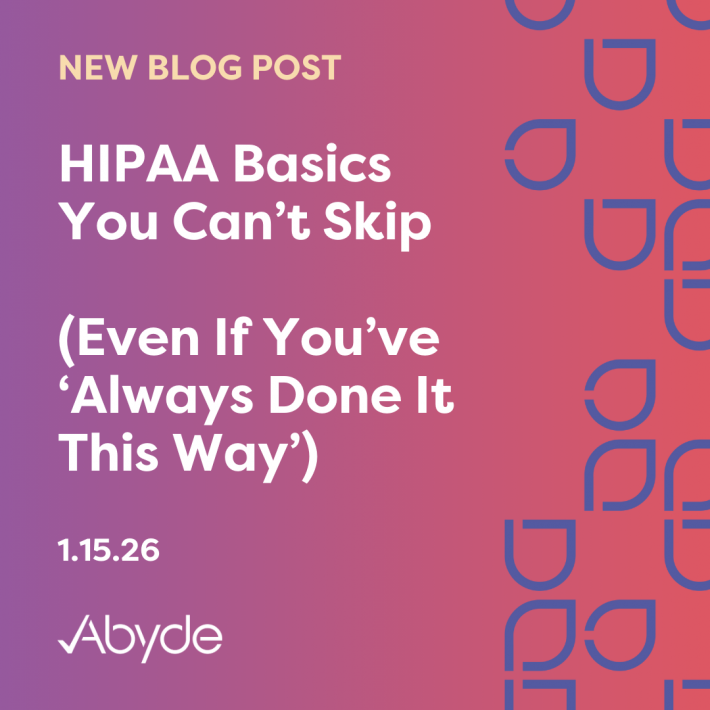February 10, 2025
Welcome to Abyde’s HIPAA Investigation Survival Series. HIPAA investigations can last for years, making it one of the most stressful experiences a practice can endure. It’s vital your practice understands the investigation process. The first step of the HIPAA investigation is the breach itself.
Experiencing a data breach is pretty common in healthcare and can affect organizations of all sizes. For example, the Change Healthcare breach, a subsidiary of UnitedHealthcare, exposed at least 100 million patients’ data.
While they might be common, it’s still your practice’s responsibility that the proper precautions are put in place to mitigate risks.
What is a Breach?
A breach is any impermissible disclosure of Protected Health Information (PHI) without authorization. PHI is data that can individually identify a patient, including information like Social Security numbers, birth dates, medical records, and more.
Healthcare faces significant data breaches due to various threats, including stolen computers and unauthorized access. However, the largest threat by far comes from ransomware and cybercrimes. Ransomware reports to the Office for Civil Rights have increased 264% in the last five years.
Ransomware can infect systems through several channels, like email. Successful phishing attempts are the most common way malicious actors hack healthcare systems. That’s why it’s imperative to provide proactive training to staff, ensuring they are aware of common phishing scams and how to handle spam emails when they arrive, such as forwarding them to IT or immediately sending them to spam.
If my practice is breached, what do I do?
If your practice is breached, handling the situation calmly is important.
Time is of the essence when it comes to HIPAA breaches, with every second pivotal for a hacker to leak more information. When becoming aware of a HIPAA breach, your practice must take the infected device offline and review the scope of the hack. In situations like these, Based on the size of your organization, it’s important to have an in-house or outsourced IT team to navigate you through the technical process.
A breach report needs to be filed as well. This can depend on the size of the breach, with breaches impacting less than 500 needing to be filed within 60 days from the end of the year and large breaches, or 500+, needing to be reported to the OCR within 60 days of discovering the breach. This report needs to be filed here. The state where a breach occurs is a crucial factor, as some states have stricter requirements, including shorter timelines.
In either situation, affected patients need to be notified. Under the Breach Notification Rule, patients must be notified within 60 days of discovering the breach. For large breaches, media notice is required, usually in the form of a press release, to ensure impacted patients are aware their health information was put at risk. Once again, depending on the state, different parties, like the State Attorney, need to be notified.
What’s Next?
The OCR may investigate your practice to ensure you had the proper protocols in place before and if the response after a breach is sufficient. This investigation would take place after breach recovery efforts are completed, such as restoring systems and notifying the necessary parties.
A common misconception is a HIPAA fine is due to a cyber attack. Sometimes, breaches occur no matter how many safeguards you have in place. Fines are levied on practices that did not take the proper precautions before an event, such as training staff, having antivirus software, or having a Security Risk Analysis (SRA) in place. The fine is not due to the breach itself, but it triggers an investigation, where fines can be levied for lack of preventative measures. During an investigation, the government looks to see that your practice has taken steps to mitigate and prevent cybersecurity issues before they escalate into a breach.
That’s why it’s imperative to implement protective measures for your practice before a breach occurs. Getting compliant can be overwhelming, but with the right tools, you can easily streamline your HIPAA program. Smart software solutions can serve as a comprehensive compliance hub, allowing you to see your practice’s vulnerabilities and offer steps to fix them.
To learn more about HIPAA compliance for your practice, meet with a compliance expert today.
Read the second installment of the series, focused on the HIPAA Investigation letter here. Read the third installment of the series, focused on organizing documentation for a HIPAA Investigation here. Finish the series here to learn about the potential outcomes of a HIPAA investigation.





